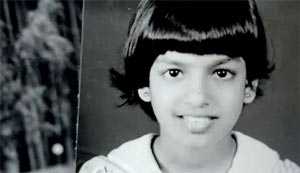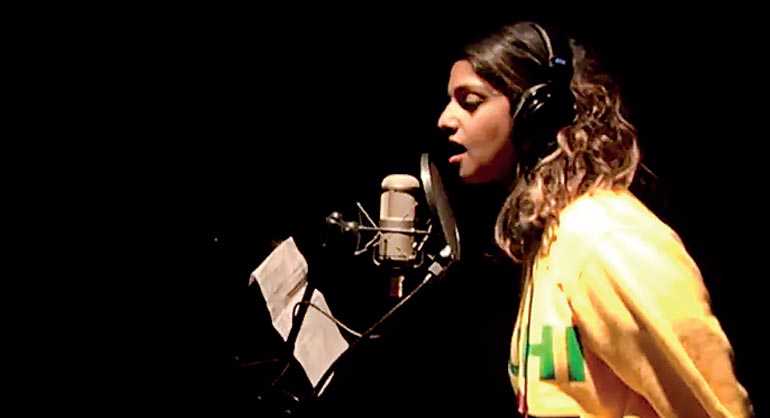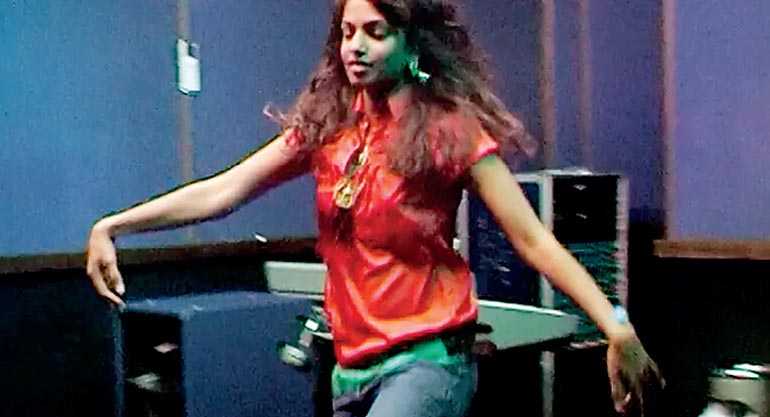Friday Feb 20, 2026
Friday Feb 20, 2026
Thursday, 27 December 2018 00:40 - - {{hitsCtrl.values.hits}}

www.smh.com.au: Mathangi Arulpragasam came to London from Sri Lanka as a refugee with her mother, brother and sister when she was eight. Her father, a founding leader of the Tamil Tigers, stayed to fight; the children scarcely knew him.
Mouthy young Mathangi, who became Maya among her London mates, had to forge her own path.
 |
Unconventional M.I.A. - CREDITMADMAN FILMS |
 |
A still from the film - CREDITMADMAN FILMS |
 |
Mathangi as a young girl - CREDITMADMAN FILMS |
“You say, ‘OK, what is the best job to get?’ and people say, ‘To be a popstar’,” says the woman now known as M.I.A.
“And so you are like ‘OK, I’m going to do that’. And then you become it. And then there are loads of problems within that.”
Even in the earliest home movies scattered through the Sundance-winning documentary Matangi/Maya/M.I.A. you can see that this little girl is itching with talent. But a talent for what?
Mathangi went to sleep listening to Madonna until her radio was stolen and she was able to hear the rap music being played next door. She was hooked.
She rapped, she danced, she befriended Elastica’s Justine Frischmann and started writing songs for her.
At the same time, as an increasingly politicised teenager, Mathangi wanted to make documentary films. It was at art college that she met Steve Loveridge, who would later spend five years putting together this intricate collage of her life.
M.I.A. is obviously difficult. Anybody familiar with her charismatic, confronting on-stage performance style or her various provocations – giving the finger to the camera and 114 million viewers during the Super Bowl in 2012, or directing a video depicting the round-up and murder of red-haired children - will not be surprised to learn that she is not happy with the film she is now promoting. She and Loveridge do their interviews together, she says, but otherwise don’t speak.
“No. Our friendship kind of fell off,” says Loveridge.
“It became really hard; me watching hours and hours of Maya all day every day, thinking about her, doing research – it started to become a bit unhealthy, like too much of one person.”
He edited the film in New York.
“M.I.A. couldn’t get a visa to go to America at that time, so I was free to sit in the edit suite without any fear that she was going to burst in the door,” he says.
They can be friends again, says M.I.A., if he lets her do another edit of the film.
“It’s not the documentary I would have made,” she says. For a start, she’d include more music.
M.I.A.’s musical success is noteworthy – her song Paper Planes, featured in Slumdog Millionaire, was nominated for both an Oscar and a Grammy – but not immediate. “I was pretty old when I came to music – like, 27,” she says.
Even during her Elastica period, she didn’t imagine performing herself; liberation came with a cheap 505 digital keyboard and the realisation that its range of sounds meant she could do anything she wanted on her own. “It was very addictive,” she says.
“You know, I’d worked in shops and things like that [but] I had no money. All I had was this microphone – I still use the same one – which connects to this box.
“And that was very empowering because that just meant you didn’t have to depend or rely on anything. I just didn’t leave the house for, like, three months. I just literally disappeared into a hole and made sounds.”
Success, when it came, was harder. M.I.A. never fitted the template of a manufactured pop princess. “I straddled the generation of punk female artists – with music being celebrated – and the moment where female musicians had to be what you see on the internet now: Instagram-ready, photographing really well from all angles and always lit well. It’s based on being visual content.”
Her brash DIY sensibility was all wrong, she was often told. She refused to follow the prescribed popstar story.
“I watched loads and loads of music documentaries while I was making this [film],” says Loveridge.
“So many of them are about the trajectory to fame – the ‘American dream’ - and then the person self-destructs. They overdose or die or it leads to some inner unhappiness.
“This wasn’t that. It was more like the dream didn’t fit.” M.I.A. is now 40. Being a popstar is not, she has realised, the best job in the world. “No, it’s a terrible job and I was very bad at it, looking back.” She recorded what she said would be her last album, AIM, in 2016 and is currently touring, but she has other ideas.
“Yes I like music and I like dancing and it is part of me, but I feel like I need to do something else to clear the palate.”
She thinks she would like to take a stab at making her own documentary.
“I’ll see,” she says, “if I can do better than Steve.”
M.I.A. performs at Lost Paradise festival, Sydney, December 28-31; Origin Fields festival, Perth, December 30-31; and the First NYD festival, Melbourne, January 1. M.I.A. appears in person at Melbourne’s Cinema Nova on January 2, presented by Noisey. Matangi/Maya/M.I.A. opens in selected cinemas on January 10.
(Source: https://www.smh.com.au/entertainment/movies/conventions-m-i-a-for-sri-lankan-born-popstar-20181224-p50o2t.html)

